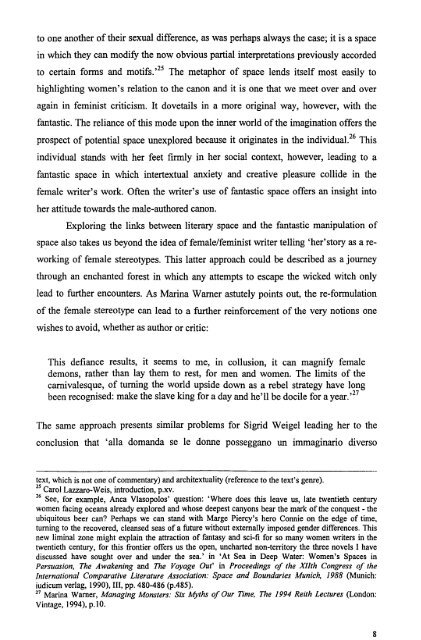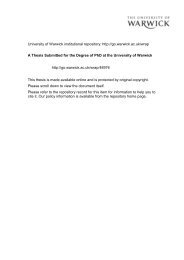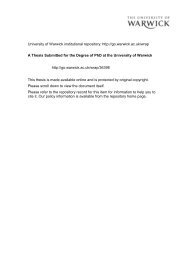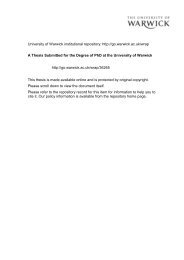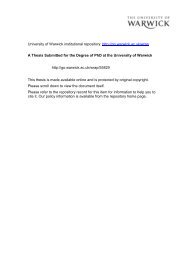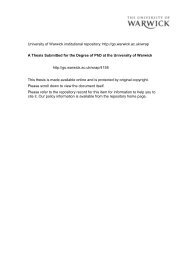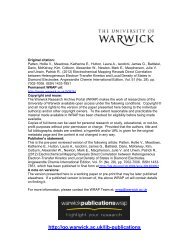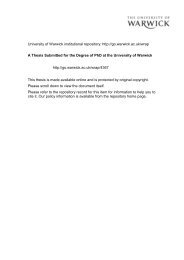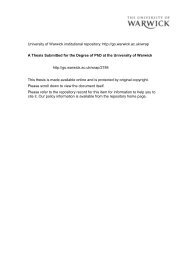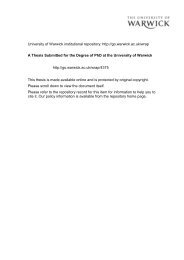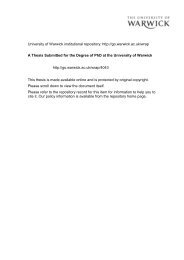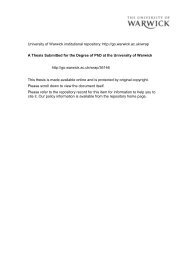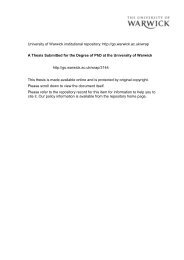Download (13Mb) - WRAP: Warwick Research Archive Portal ...
Download (13Mb) - WRAP: Warwick Research Archive Portal ...
Download (13Mb) - WRAP: Warwick Research Archive Portal ...
You also want an ePaper? Increase the reach of your titles
YUMPU automatically turns print PDFs into web optimized ePapers that Google loves.
to one another oftheir sexual difference, as was perhaps always the case; it is a space<br />
in which they can modify the now obvious partial interpretations previously accorded<br />
to certain forms and motifs.,25 The metaphor of space lends itself most easily to<br />
highlighting women's relation to the canon and it is one that we meet over and over<br />
again in feminist criticism. It dovetails in a more original way, however, with the<br />
fantastic. The reliance of this mode upon the inner world ofthe imagination offers the<br />
prospect of potential space unexplored because it originates in the individual." This<br />
individual stands with her feet firmly in her social context, however, leading to a<br />
fantastic space in which intertextual anxiety and creative pleasure collide in the<br />
female writer's work. Often the writer's use of fantastic space offers an insight into<br />
her attitude towards the male-authored canon.<br />
Exploring the links between literary space and the fantastic manipulation of<br />
space also takes us beyond the idea offemale/feminist writer telling 'her'story as a re<br />
working of female stereotypes. This latter approach could be described as a journey<br />
through an enchanted forest in which any attempts to escape the wicked witch only<br />
lead to further encounters. As Marina Warner astutely points out, the re-formulation<br />
of the female stereotype can lead to a further reinforcement of the very notions one<br />
wishes to avoid, whether as author or critic:<br />
This defiance results, it seems to me, in collusion, it can magnify female<br />
demons, rather than lay them to rest, for men and women. The limits of the<br />
carnivalesque, of turning the world upside down as a rebel strategy have long<br />
been recognised: make the slave king for a day and he'll be docile for a year.'27<br />
The same approach presents similar problems for Sigrid Weigel leading her to the<br />
conclusion that 'alla domanda se Ie donne posseggano un immaginario diverso<br />
text, which is not one ofcommentary) and architextuality (reference to the text's genre).<br />
2S Carol Lazzaro-Weis, introduction, p.xv.<br />
26 See, for example, Anca Vlasopolos' question: 'Where does this leave us, late twentieth century<br />
women facing oceans already explored and whose deepest canyons bear the mark ofthe conquest - the<br />
ubiquitous beer can? Perhaps we can stand with Marge Piercy's hero Connie on the edge of time,<br />
turning to the recovered, cleansed seas of a future without externally imposed gender differences. This<br />
new liminal zone might explain the attraction of fantasy and sci-fi for so many women writers in the<br />
twentieth century, for this frontier offers us the open, uncharted non-territory the three novels I have<br />
discussed have sought over and under the sea.' in 'At Sea in Deep Water: Women's Spaces in<br />
Persuasion, The Awakening and The Voyage Out' in Proceedings of the XlIth Congress of the<br />
International Comparative Literature Association: Space and Boundaries Munich, 1988 (Munich:<br />
iudicum verlag, 1990), III, pp. 480-486 (p.485).<br />
27 Marina Warner, Managing Monsters: Six Myths ofOur Time. The 1994 Reith Lectures (London:<br />
Vintage, 1994), p.lO.<br />
8


